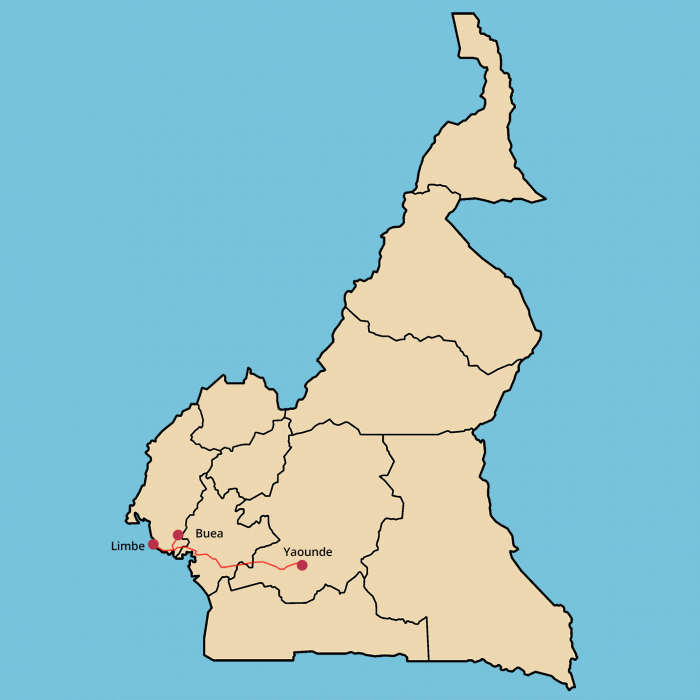April 13th, 2016 by Rachel | Tags: Disability, Peace Corps, Persons with Disabilities of Cameroon, Photography | No Comments »
During the last seven months of my Peace Corps service, I am featuring photographs and stories of several persons with disabilities living in Cameroon. All the photos are part of a series called “Persons with Disabilities of Cameroon.” The goal of presenting photographs and their stories is to create better awareness about the plights that persons with disabilities face in a developing country. When I return to the US, I hope to exhibit this series in a gallery and publish a book to educate others about persons with disabilities living in developing countries as this topic is so rarely discussed in the media.
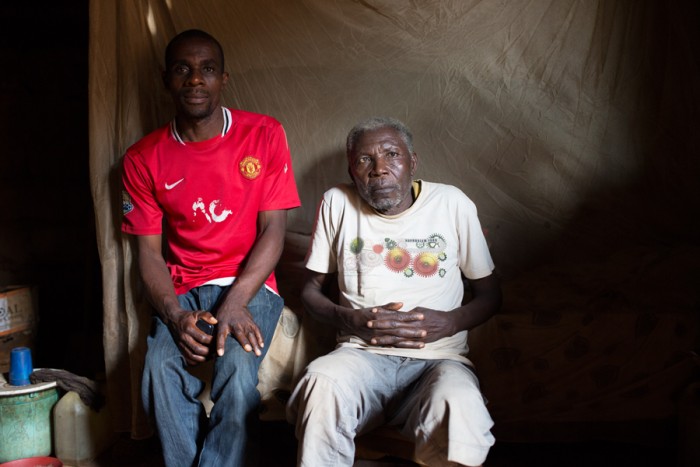
The son of Joseph, Albert, happens to have a disability too. His disability was caused by polio which he had when he was two years old in 1974. “He was already standing and walking before he became sick,” said his father. His father and mother who happened to be a midwife working in the hospital took him to the hospital for examination when their son fell ill.
When the parents took Albert to the hospital and learned that he had contracted polio, according to Joseph, the doctor told him and his mother that 22 other children who were living in a special compound for police officers and families called “police barracks” in Buea became ill with polio too. Albert and his family were living in police barracks when Joseph was working as a police officer.
After Albert had polio, he could no longer stand and walk but he relearned to walk and stand. He can walk with a limp. All other 22 children from the police barracks became disabled too. Joseph said that three of them walked on their knees while the rest walked with a limp like Albert.
When he was in primary school, children made fun of him by imitating the way he walked. He completed primary school but didn’t go to secondary school. His father didn’t have money for secondary school because he was suspended from police job for five years. The suspension was related to when he took the case to high court in Yaounde.
Albert cannot play sports. When he works, he has chest pains and pain in his legs due to difficulty standing up for a long period of time. He works as a carpenter. He feels that he takes longer time to finish work than a person without disability. This results in making fewer items and earning less money. He said he would like to be able to buy certain machines that he cannot afford to buy. He added that he wishes he could drive a moto bike or a car but he can’t because he can’t push the breaks.
He also said that he feels the pressure of high expectation to bring in a good amount of money for the family. He is married with four small children. He struggles to do farm work because it’s physically challenging.
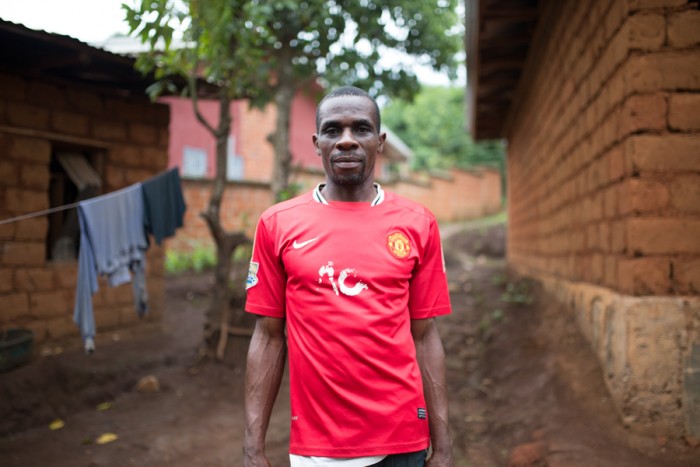
April 11th, 2016 by Rachel | Tags: Disabilities, Peace Corps, Persons with Disabilities of Cameroon, Photography | No Comments »
During the last seven months of my Peace Corps service, I am featuring photographs and stories of several persons with disabilities living in Cameroon. All the photos are part of a series called “Persons with Disabilities of Cameroon.” The goal of presenting photographs and their stories is to create better awareness about the plights that persons with disabilities face in a developing country. When I return to the US, I hope to exhibit this series in a gallery and publish a book to educate others about persons with disabilities living in developing countries as this topic is so rarely discussed in the media.

When first entering the home of Joseph, I saw him outside of the house doing yard work. The way he was doing yard work was unusual. He was sitting on a small bench and sweeping the dirt while sitting on the bench. To move, he would lift the bench while on it with both hands and move it a few centimeters forward.
After he finished his yard work, I entered his residence. He lives in an unfinished dark one room that is attached to his son’s house. The floors and walls are unfinished. The floor is nothing but dirt. In the room, there is a bed with a mosquito net, a wood stove for cooking, a bookshelf and a couple of small benches. This gentleman stays in this room all day and every day except when he goes outside for a few minutes to do yard work. He leaves his compound only once a month when he goes to the hospital.
Joseph was a police officer for 27 years. He worked for the Cameroonian government in three regions, Northwest, Southwest, and East. When he turned 50 years old in 1992, he had to retire because of the age limit for police officers. It’s a policy in Cameroon. If he had a higher status, such as principal or commissioner, he could have worked until 55 or 60 years respectively.
When he retired, he switched to small farming. Even though retirement benefits exist for police officers in Cameroon, he did not receive any benefits due to taking a case to the court. The case was about wrongly killing a prisoner. Joseph and other police officers were able to prove in high court in Yaounde and to the General Delegation for National Security that the commissioner did indeed wrongly kill the prisoner. Because they won the case, other commissioners at the police office where he worked at the time wrote negative statements in the records about Joseph that resulted in cutting his retirement benefits.
In 2009, one day long after Joseph retired, all of a sudden he was shaking and fell and hit his right hip and broke the hip. He did not go to the doctor. He had no money for medical care. He never received an x-Ray or any kind of assessment or treatment. He can no longer stand up and walk. He also cannot move his right leg. He feels pain all the time in his right hip and upper part of his right leg. “I feel pain all the time,” he said. As a result, he can only move by sitting on a small bench and lifting and pushing himself on the bench.
Even though Joseph has never seen a doctor for his hip issue, he goes to the hospital once a month to see a doctor for diabetes and hypertension. When I asked him why he has money for diabetes and hypertension but not for his hip, he explained that he can afford to pay for diabetes and hypertension but not his hip issue. He said that he pays 10,000 CFA (USD$ 17) once a month for transportation, doctor, medicines, and lab tests. He said to pay for the hip issue, it costs a lot more money and is not affordable. The money comes from his savings that he saved during his time as a police officer and from a good “Samaritan” who stopped by his home and gave him money. His son, Albert, brings a moto bike driver to the front door of his home. He helps him get on the moto bike and takes him to the hospital and brings him back home. This is the only time he leaves his compound.
When Joseph broke his hip, he had to give up his work on the small farm owned by his son that is located in another part of Bamenda. Albert brought him to his compound to live with his family so that he could get help.
When I asked Joseph what is his biggest barrier, he said, “I cannot move anywhere. I cannot go to church. I cannot watch football with the crowds. I cannot go anywhere. I want any help I can get to fix my hip.”
He then added, “When my family, my nephew, died. I could not go to the funeral.”
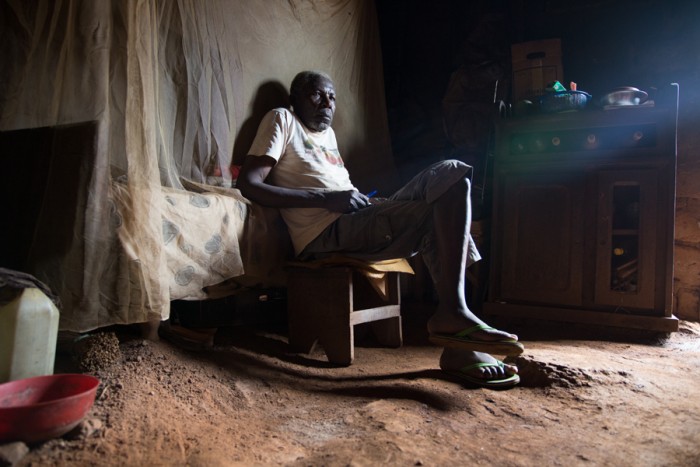
April 7th, 2016 by Rachel | Tags: Disability, Peace Corps, Persons with Disabilities of Cameroon, Photography | No Comments »
During the last seven months of my Peace Corps service, I am featuring photographs and stories of several persons with disabilities living in Cameroon. All the photos are part of a series called “Persons with Disabilities of Cameroon.” The goal of presenting photographs and their stories is to create better awareness about the plights that persons with disabilities face in a developing country. When I return to the US, I hope to exhibit this series in a gallery and publish a book to educate others about persons with disabilities living in developing countries as this topic is so rarely discussed in the media.

In a country where resources are so lacking for persons with disabilities, their potential to grow their mind goes unnecessarily wasted. A 17 year-old teenage boy who is both deaf and blind grew up never going to school. A few humanitarian groups have visited him in home while he was growing up and tried to take him to school but they all found that he couldn’t learn because had no sight and no hearing to communicate. When one is deaf and has no access to technologies such as hearing aids and cochlear implants, the person cannot learn the language through hearing and speaking. Sign language provided deaf people who had no access to technologies a visual system of communication. When blindness is added to deafness, one has to learn tactile sign language, a language system that involves touching the hands of a person who signs. However, in a country like Cameroon where resources and knowledge are limited, tactile sign language is often unheard of.
Sylvester was born with normal hearing and vision. At age two years old, he became sick one morning. The mother said he had discharges on his eyes and she and her husband noticed that when touching top of his head, blood was no longer pumping. His parents took him to Bamenda Regional Hospital. He stayed at the hospital for one week where he received eye drops. He was then transferred to another hospital in a nearby village, Mbengwi, that happened to have an eye specialist. When he was in Mbengwi for two weeks with his mother, a doctor tried to operate on his eyes because his eye lids became permanently shut. The mother said thirty minutes into the anesthesia, the doctor said they could no longer operate him and it was better to leave his eye lids shut because he would die otherwise. His deafness was first discovered too while staying in Mbengwi. When they were testing his eyes by using flashing lights, they put an instrument in his ears to test his hearing. Hearing aids have not been available to him to try.
Before he became sick, he was hearing and talking. He was able to say papa, mama, and call people’s names. He enjoyed listening to music. He was punching in numbers on the phone key pad to hear the tones.
When the mother and father first learned that their son is deaf and blind, the mother cried but the doctor comforted her and asked her to take her son home. She said since bringing her son home, “it has only been God and prayers who has comforted [her].” When they came home, she said that she and her husband concluded that “only God knows who gave him deafness and blindness.” The mother added that people in the community told her and her husband that their son’s deafness and blindness were caused by witchcraft but the parents told them, “Only God knows.”
Shortly after bringing Sylvester home, the mother had to take him to a local clinic again twice due to discharges coming back in his eyes and needing eye drops.
The parents did not figure out how to effectively communicate with their son. They let him play and be on his own. When Sylvester was growing up, the mother taught him how to cook and wash himself and clothes. He can tell which clothes are clean or dirty by smelling. He knows how to put his clothes away and find his clothes. He knows how to dress himself. He can eat by himself. She taught him how to fetch water from a well. He knows how to walk to a well and get water. He can sweep the floor and wash dishes and things. She has created one tactile sign language. When she touches his palm of his hand with her fingers closed in, he knows that he has to get his dish for food. The mother added that he was also taught how to pray. He knows how to put his hands together to pray.
Sylvester has finally been in school for the first time in his life in the past seven months to learn how to do handicrafts, which includes making brooms and baskets. There is a bus that comes to pick him and take him to school and bring him back home and goes there five days a week, Monday through Friday. The mother first learned about the school when a staff member came to the house and encouraged her to send him to school.
Before he started going to school, he stayed at home all day. He was often angry. When he was angry, he ran around, hit and throw things and break them. The mother also said that when he was angry, she could tell that he was lonely and bored. The mother struggled to keep him busy at home and found that keeping him busy was a challenge. To calm him down, she would hold his hand and when he smelled her, he calmed down knowing that his mother was present. Since he started school, the mother said that she noticed that his anger has decreased.
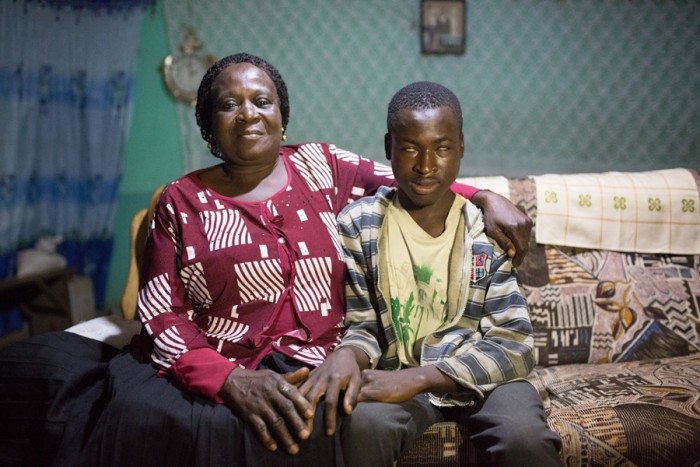
Sylvester with his mother.
April 4th, 2016 by Rachel | Tags: Disability, Peace Corps, Persons with Disabilities of Cameroon, Photography | No Comments »
During the last seven months of my Peace Corps service, I will be featuring photographs and stories of several persons with disabilities living in Cameroon. All the photos will be part of a series called “Persons with Disabilities of Cameroon.” The goal of presenting photographs and their stories is to create better awareness about the plights that persons with disabilities face in a developing country. When I return to the US, I hope to exhibit this series in a gallery and publish a book to educate others about persons with disabilities living in developing countries as this topic is so rarely discussed in the media.
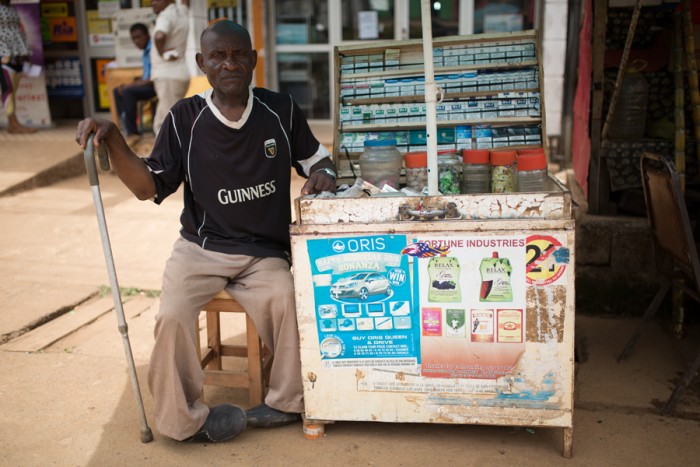
From looking at Richard, it may appear that he was born with club feet, but his feet were normally structured when he was born. When he was three years old, he had high fever and was taken to Bamenda Regional Hospital by his parents. The hospital gave him a Quinimax injection which was administered on one side of his buttocks. Before he was sick, he was able to walk normally and very well. The injection, which is known to cause paralysis, weakened both of his legs. He then was no longer able to walk. Both legs became very weak. His parents took him to a traditional healer. The traditional healer cut both of his legs and put traditional medicines into his legs. He said, “That is why I am able to walk.” He can walk slowly with a walking stick but his feet are turned inwards. He says his feet became deformed when he became sick. He also uses a tricycle to move around. He says, “When I was given a national disability card, the medical report said I have 90% deformity.”
While only 2% of all Cameroonians with disabilities receive formal education, Richard defied against the deplorable statistic. Thanks to his parents who believed in him, he completed primary and secondary school. His parents sent him to a Christian school, and they paid the fees. If he had gone to a government school, it would have been cheaper because of disability ID card. Children with disabilities in Cameroon can go to a government school at a reduced fee if they have a disability ID card. There were missionary workers, and Richard said they were very accommodating. He had little barriers in going to school because he had a tricycle growing up and used it to commute to school.
He is a businessman now and sells basic needs on a street including cigarettes, lighters and tissues. He is married. His wife helps with household work. He has three children, ages ranging from 3 years old to 11 years old.
His biggest challenge today as a persons with disability is gaining access to healthcare because the cost is too high. He said that there are treatments that he would like to get but he can’t due to lack of financial means. He also said that he believes that his disability impacts his ability to earn money. He also said that he wishes to work with computers as an occupation and hopes to go to a computer school so that he can get a job working with computers.
His mother passed away in 2006 due to stress at the age of about 70 years old. Like most elderly Cameroonians, no one knows her birth date as there were no birth certificates. Richard and his family owned a bookstore selling religion books. There was a fire disaster in the same year, and the whole bookstore was destroyed. The fire was caused by an electric heater that was left on in the building next door. As a result, his mother became stressed because they no longer could make money for the family. He still has the building but he has not had the money to rebuild it. That is why he has been working on the street as a businessman. His father also passed away at the age of about 70 years old, in 2011, due to kidney problems.
March 28th, 2016 by Rachel | Tags: Peace Corps, Travel | No Comments »
Over one week ago, I traveled to the southern part of the Southwest region to see another part of Cameroon. Alex and I explored Limbe, one of the two well-known beaches in Cameroon, and also Buea, the capital of the Southwest region.
Some Peace Corps Volunteers say they prefer Kribi, Cameroon’s other well-known beach, because it is prettier. While I can understand their perspective as there oil drills presented very visibly on the ocean which disturbs the beautiful view of the beach, I believe no one can compare Limbe and Kribi because both beaches are simply different. Limbe is still so beautiful with many mountains surrounding the ocean. One can get wonderful and tasty grilled fish by the water. Alex and I visited a restaurant called Down Under, a to-go place for grilled fish that is located right on the beach, and shared a giant grilled fish, which tasted very good. Visiting the beach is not the only highlight of Limbe. The town also has a Wildlife Center where one can see various animals from different parts of Cameroon including gorillas, chimpanzees, and monkeys. All of the animals were rescued from danger and specialists are taking a good care of them. At the Wildlife Center, they have a restaurant called Arne’s that sells western food such as hamburgers, grilled cheese, and pizzas. Then there is also a Botanical Gardens which looks like a beautiful and well-maintained park.
I was in awe by how clean and more modern Limbe is compared to other cities and towns of Cameroon. The roads looked shiny and new. The landscape were clearly well maintained. It was clear that a lot of effort and thoughts have been put into the landscape because the bushes and grasses were well trimmed. In other parts of Cameroon, maintaining the landscapes is a clearly forgotten thought. The buildings appeared to be better built and maintained too.
After visiting Limbe, Alex and I went to Buea, which is located about 30 minutes from Limbe. As we drove to Buea, I could see that growing coffee is a big part of the southern part of Southwest region. One we arrived in Buea, I was once again amazed by the quality of the landscape. The roads were well paved. The buildings appeared to be a little more modern than what I have seen in other parts of Cameroon. Alex and I saw some German buildings that were built by the Germans when they colonized all of the country from 1884 to 1916. Buea was the capital of the country the Germans colonized it.
While in Buea, we also visited a restaurant, Lya Buea, that was recently built by a friend of Alex who is a Cameroonian but born and raised in London. Alex met the friend while studying French in France right before joining the Peace Corps. We enjoyed incredible food for both lunch and dinner at the restaurant. We tasted traditional Cameroonian beef and pork skewers, chicken with peanut sauce, banana split with ice cream, and salad. The restaurant is located right by University of Buea.
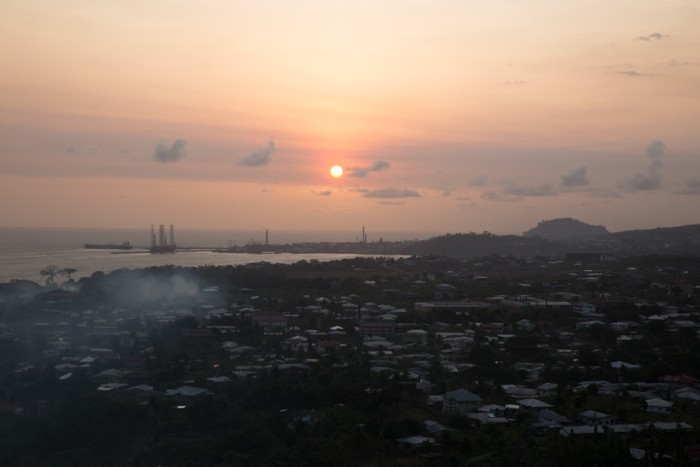
Sunset at Limbe Beach
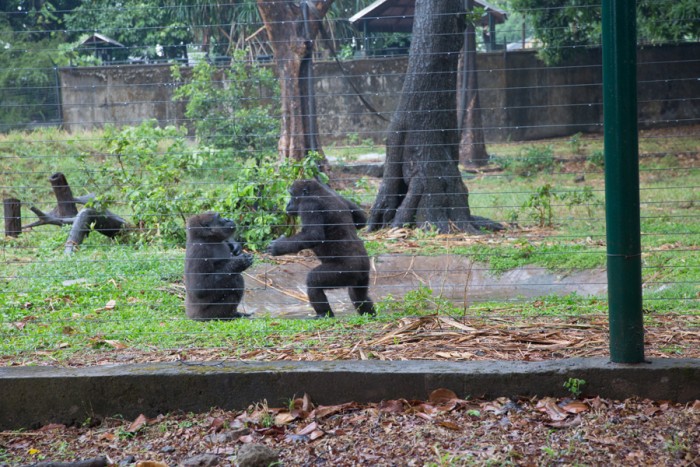
Gorillas at Wildlife Center in Limbe

Chimpanzees at Wildlife Center in Limbe
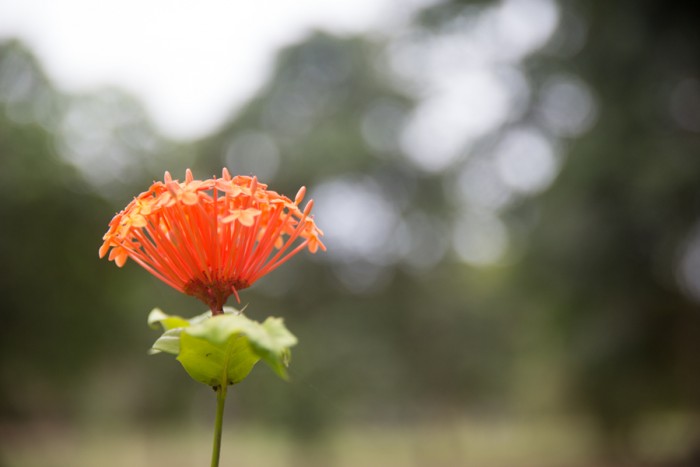
Botanical Garden at Limbe
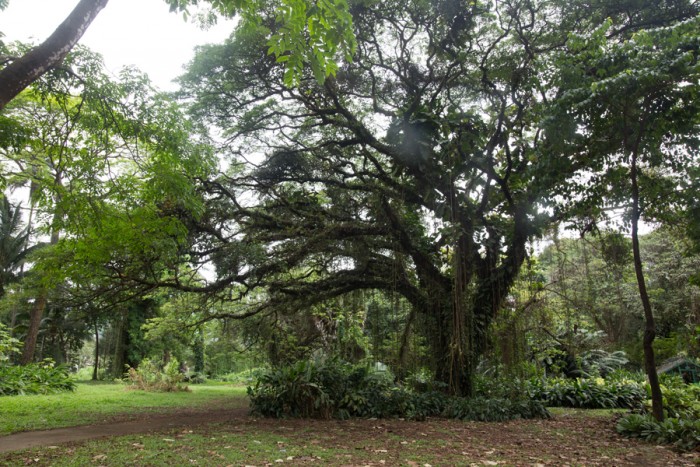
Botanical Garden at Limbe
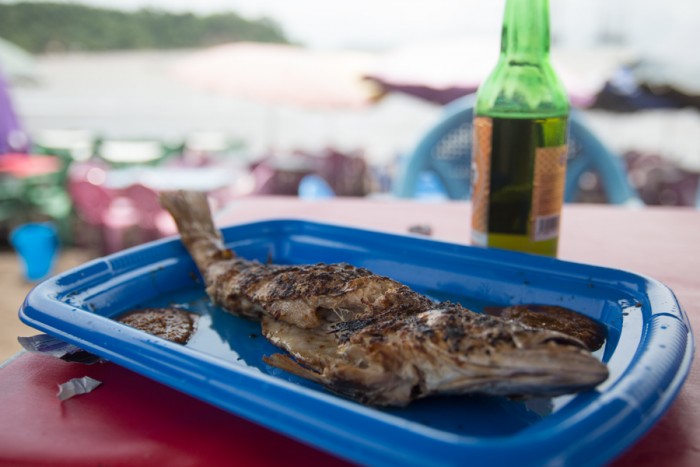
Grilled fish

Limbe Beach
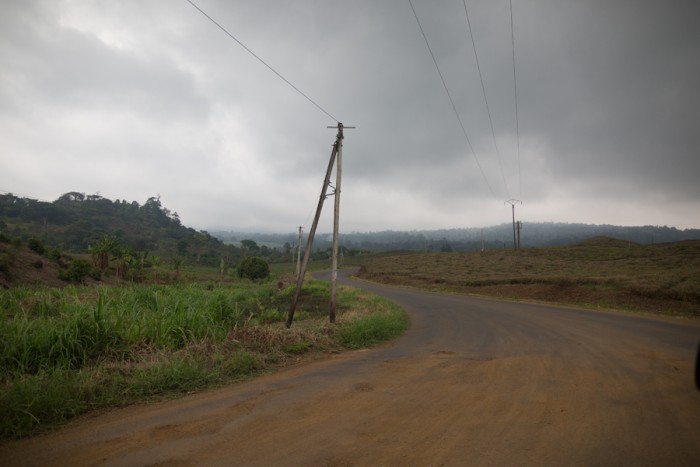
Road to Buea from Limbe
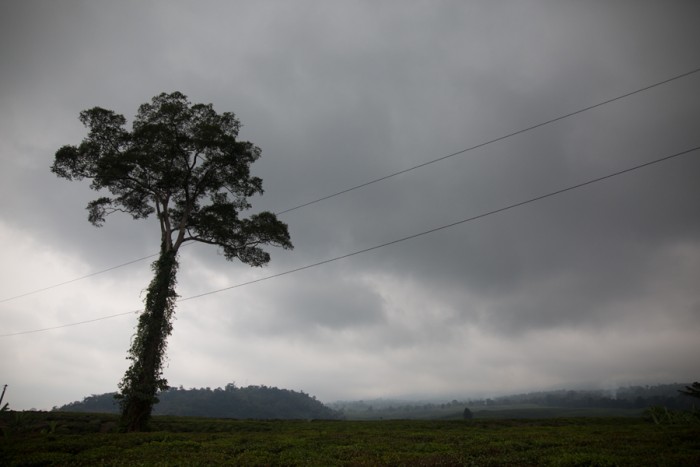
Road to Buea from Limbe

Beef Skewers from Lya Buea, a restaurant founded by a Cameroonian born and raised in London
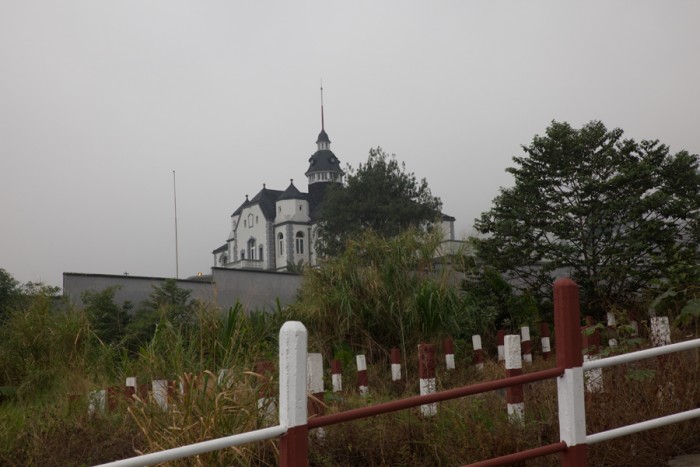
An old German building built by Germans when they were colonizing Cameroon
Buea and Limbe are about six to eight hours drive by bus from Yaounde. The length of the ride is largely dependent on the traffic in Douala, the largest city in Cameroon. When Alex and I went to Limbe, we sat in the traffic in Douala for three hours. There is absolutely no way to be able to go around Douala. The bus tickets cost about 6000 CFA to 10000 depending on which bus we take.
